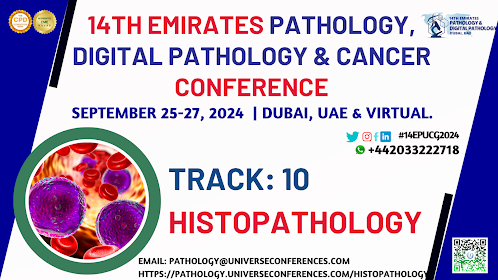Revolutionizing Diagnostics: The Role of AI in Digital Pathology
In recent years, the integration of artificial intelligence (AI) into digital pathology has ushered in a new era of diagnostic precision and efficiency. This technological revolution is transforming the way pathologists analyze tissue samples, diagnose diseases, and develop personalized treatment plans. Let's explore how AI is reshaping digital pathology and the benefits it brings to the field of medicine.
Enhancing Diagnostic AccuracyOne
of the most significant advantages of AI in digital pathology is its ability to
enhance diagnostic accuracy. Traditional pathology relies heavily on the
expertise of pathologists to manually examine tissue samples under a
microscope. This process can be time-consuming and subject to human error. AI
algorithms, on the other hand, can analyze digital images of tissue samples
with remarkable speed and precision.
AI-powered
image analysis tools are trained on vast datasets of labeled images, enabling
them to recognize patterns and features indicative of various diseases. For
instance, in breast cancer diagnosis, AI can assist in identifying malignant
cells, grading tumors, and even predicting patient outcomes. By providing a
second set of eyes, AI helps pathologists make more accurate and consistent
diagnoses.
Improving Workflow Efficiency
Pathology
departments often face challenges related to workload and turnaround times. The
introduction of AI can significantly improve workflow efficiency. AI algorithms
can pre-screen slides, flagging areas of interest that require closer
examination by pathologists. This reduces the time pathologists spend on
routine tasks, allowing them to focus on complex cases that require their
expertise.
Furthermore,
AI can automate routine processes such as quantifying biomarkers and measuring
cell densities. This automation not only speeds up the diagnostic process but
also ensures standardized measurements, reducing variability between different
pathologists and institutions.
Facilitating Personalized
Medicine
AI
in digital pathology is playing a crucial role in the advancement of
personalized medicine. By analyzing vast amounts of data, AI can identify
molecular and genetic markers associated with specific diseases. This
information can guide treatment decisions, enabling personalized therapies
tailored to individual patients.
For
example, in the case of cancer, AI can analyze genetic mutations within tumor
cells, helping oncologists choose the most effective targeted therapies. This
approach maximizes treatment efficacy while minimizing side effects, ultimately
improving patient outcomes.
Overcoming Challenges and
Ensuring Ethical Use
While
the benefits of AI in digital pathology are substantial, there are also
challenges to address. Ensuring the ethical use of AI, maintaining patient
privacy, and addressing biases in AI algorithms are critical considerations.
Collaborative efforts between pathologists, data scientists, and regulatory
bodies are essential to establish guidelines and standards for the responsible
deployment of AI in healthcare.
Moreover,
the integration of AI should be seen as a tool to augment, not replace, human
expertise. Pathologists' insights and clinical judgment remain invaluable in
the diagnostic process. AI should serve as an assistant, providing valuable
support and enhancing the capabilities of pathologists.
The Future of
AI in Digital Pathology
The
future of AI in digital pathology holds immense promise. Ongoing advancements
in machine learning, deep learning, and data analytics will continue to refine
AI algorithms, making them even more accurate and reliable. Additionally, the
integration of AI with other technologies, such as digital imaging and
telepathology, will further expand its reach and impact.
As
AI continues to evolve, its potential to revolutionize diagnostics, improve
patient care, and advance personalized medicine will only grow. Embracing this
technology and fostering collaboration between clinicians and technologists
will be key to unlocking its full potential.
Conclusion
AI
is revolutionizing digital pathology by enhancing diagnostic accuracy,
improving workflow efficiency, and facilitating personalized medicine. While
challenges remain, the responsible and ethical integration of AI into pathology
practice holds the promise of transforming healthcare for the better. As we
move forward, the synergy between human expertise and artificial intelligence
will pave the way for a new era of precision diagnostics and patient care.
===========================
Conference
Name: 14th
Emirates Pathology, Digital Pathology & Cancer Conference
Short
Name: 14EPUCG2024
Dates:
December 17-19, 2024
Venue:
Holiday Inn Dubai, UAE & Online
Email: pathology@universeconferences.com
| Call Us: +1 (207) 707-7298
Visit: https://pathology.universeconferences.com/
Submit
here: https://pathology.universeconferences.com/submit-abstract/
Register
here: https://pathology.universeconferences.com/registration/
Online Registration here: https://pathology.universeconferences.com/virtual-registration/
WhatsApp
us at: https://wa.me/442033222718?text=
#PathologyTechnology
#AIMedTech #SmartPathology #AIinMedicine #DigitalHealth #AIAlgorithms
#MachineLearningInPathology #Telepathology #RemotePathology #DigitalPathology
#VirtualPathology #Telemedicine #PathologyConsultation #Telehealth
#TeleDiagnosis #Pathology #Pathologists #MedicalPathology #ClinicalPathology
#PathologyEducation #DiagnosticPathology #HealthTech #MedTech #DigitalHealth
#HealthInnovation #AIinHealthcare #MachineLearning #Healthcare #Medicine
#MedicalScience #HealthcareTechnology #PatientCare #HealthcareInnovation #MedEd
#MedStudent #PathologyResident #MedicalEducation #ContinuingEducation
#PathologyConference #MedicalConference #HealthcareConference #Networking #DigitalPathology
#AIinHealthcare #AIDiagnostics #PathologyAI #DigitalDiagnosis #AIPathology
#MedicalAI #HealthcareInnovation
.png)


.png)
Comments
Post a Comment